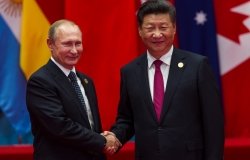Challenges and Opportunities of Globalization in India
Bharat Wakhlu, President, Tata, Inc; Under Secretary Franklin Lavin, U.S. Department of Commerce; Devesh Kapur, Director, Center for Advanced Study of India, University of Pennsylvania Read the transcript of Under Secretary Lavin's remarks.
Overview
This Asia Program event, co-sponsored with the Federation of Indian Chambers of Commerce, explored the dynamics of globalization in today's India, highlighting both opportunities and challenges through the distinct perspectives of the three speakers. With the unfolding process of globalization and the significant role of economic reforms in India, issues of inclusive and fair economic growth are extremely salient. The ability of economic reforms in the various areas of trade, investment, and services to simultaneously address the concerns of Indian society as well as both national and international private sector actors is becoming increasingly imperative to the achievement of sustainable and equitable economic growth in India.
Bharat Wakhlu provided a concise overview of the Indian economy's rapid progress since the implementation of key economic reforms in 1991. India's economic growth has increased from 5.2 percent in 1991 to 9 percent today, and foreign reserves have soared from US $2 billion to $200 billion, while the fiscal deficit and debt burden have significantly decreased. Wakhlu asserted that the five central challenges of globalization in India are governance, energy and resources, equity, security, and ecology. While the private sector in India wants the democratic process to be more efficient, particularly in infrastructure development, Wakhlu stresses that it is through empowering citizens with education and deepening the democratic system that infrastructure development will best be achieved. Environmental sustainability needs to be a priority for the private sector, particularly since "the effective use and management of energy will become paramount for the long-term success of the nation," especially because India has an energy-deficit. Furthermore, it is crucial that the creation of new wealth in India be accompanied by equitable distribution with the less-privileged. The Tata Group, Wakhlu highlighted, has substantial corporate social responsibility initiatives that carry out rural development programs, sustainable environmental policies, and offer scholarship opportunities.
Under Secretary Franklin Lavin began by presenting his thesis, "that the most critical element of India's globalization today is its economic relationship with the United States." Lavin admitted that while his thesis may be provocative, it is important to prioritize the U.S.-India economic and political relationship due to the historical weakness of the bilateral relationship. A key event in bilateral relations occurred a year ago, when President Bush met with Prime Minister Manmohan Singh and signed two economic initiatives. The two leaders decided to promote commercial ties, and to improve bilateral economic policies. Lavin emphasized that due to the "policy choices and hard work" of the Indian public and private sectors, the pace of U.S.-India business activity has accelerated substantially, resulting in the "largest ever trade mission undertaken by the U.S. government to any country in the world" in November 2006. Progress in the U.S.-India economic relationship has occurred in the areas of civil aviation, under the "open skies agreement"; tariff cuts in industrial goods; extensions in patent protection; some flexibilities in investment regulations; and increased publicity on educational opportunities in the U.S. for Indian students. However, Lavin warned that significant challenges still remain, particularly in the areas of remaining limitations on foreign investment and ownership, tariff rates that are high relative to global rates, and patent law that still do not "meet the needs of the 21st century marketplace." In conclusion, Lavin stated that the key question is whether India is on a long-term path of reform, or whether the world is simply witnessing "the Indian moment."
Read the transcript of Under Secretary Lavin's remarks.
Devesh Kapur focused on the interface of the challenges in Indian public administration and the rising socio-economic inequality resulting from the domestic effects of India's globalization process. Public services and administration, Kapur stated, such as the police forces, land rights, education, and health, are in crisis. In a national context of farmer suicides, increasing militant movements, and the marginalization of indigenous and tribal communities, these public administration crises are deeply problematic. The quality of the Indian police has sharply deteriorated, due to the extensive bribery by state officials of local police forces. This type of institutionalized corruption is also seen in India's special economic zones. Kapur explained how the land of smallholder farmers is regularly appropriated by unaccountable and non-transparent mergers between the state and the private sector. These land appropriations are fueling social unrest, leading to increased levels of violence between the state authorities and the peasantry. In higher education, Kapur forecasts that there will be a major catastrophe in the near future, as the privatization of universities, along with the manipulation by elites of the caste-based quota system of admission into universities, augments the exclusion of the poor from higher education opportunities. Kapur stressed that the link between education and social justice in India is increasingly salient, as social inequalities limit access to severely limited educational resources.
Drafted by Bhumika Muchhala, Asia Program Associate
Robert M. Hathaway, Director, Asia Program, Ph: (202) 691-4020
Documents & Downloads
Hosted By

Indo-Pacific Program
The Indo-Pacific Program promotes policy debate and intellectual discussions on US interests in the Asia-Pacific as well as political, economic, security, and social issues relating to the world’s most populous and economically dynamic region. Read more
Thank you for your interest in this event. Please send any feedback or questions to our Events staff.










